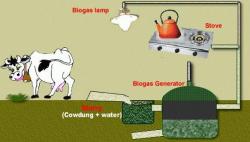
TRIBUNJOGJA.COM, SLEMAN – Amidst the discourse of rising price of 12-kg capacity LPG tank, Ratih (28) is not worried. This is primarily due to the gas stove installation in her kitchen, where the primary source of energy, the Biogas, is generated through livestock manure. A week has gone by, she uses the stoves along with the digester facility provided as a support from Sleman Regency Administrative worth Rp 120 millions. According to her, biogas-powered gas stoves produce a blue flame, which is comparable to the flame produced by conventional gas stoves.
“The flame is blue-colored and it is intense, and thus cooking time is shorter,” she said on Thursday (8/14).
According to her using biogas is more efficient, for she no longer has to rely on gases on the marketplace. However, she has to consistently refill the cow manures on the digester provided by the Sleman Regency Admnistrative.
“Simply refill this equipment (digester-ed) with cow manures, once every three days. When the gas power is out, wait for two hours, until it is completely refilled and ready for use,” she explained.
In the meantime, the cow manures are obtained from the stables belonging to the surrounding communities.
Ratih is an early beneficiary recipient, the biogas facility initiated by the Office of Water and Mineral Resources (ESDAM) of Sleman. In her village in Karanggawang Kulon, Monorejo, Tempel, there are four households which received such assistance. Nonetheless, her household is the only household receiving the equipment in the form of gas stoves and Biogas Manometer channeled to her house.
Ngatini (50), Ratih’s neighbor, admitted that she has not received such facilities. Nonetheless, she is interested to try to use such alternative energy.
“I have not received the gas stove facility, I will buy it myself one day when I have the money,” she said.
Meanwhile, the Section Head of the Development of ESDAM in Sleman, Slamet Purwoko stated, such assistance is the initiative of the Regency Administrative to maintain energy security of the village community. He expects that the presence of Biogas program, will enable the community to access a renewable energy resources.
“I do hope that the village community will no longer rely on LPG and firewood. The new alternative fuel is here,” he uttered.
This pilot program has been implemented in seven villages scattered subsequently in 2 villages at Tempel Subdistrict, 2 villages at Cangkringan Subdistrict, 2 villages at Kalasan Subdistrict, and 1 village at Moyudan Subdistrict.
The biogas program itself has been initiated since last June. The process involves preparation for means and infrastructures, along with the chemical process to transform the cow manures into a biogas. After turning the cow manures into biogas, the manures still leave some additional benefits of becoming the plant fertilizer. (Pdg)
Report by Tribun Jogja Reporter, Padhang Pranoto.


